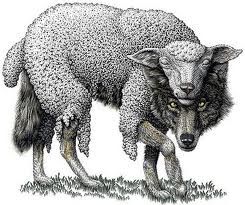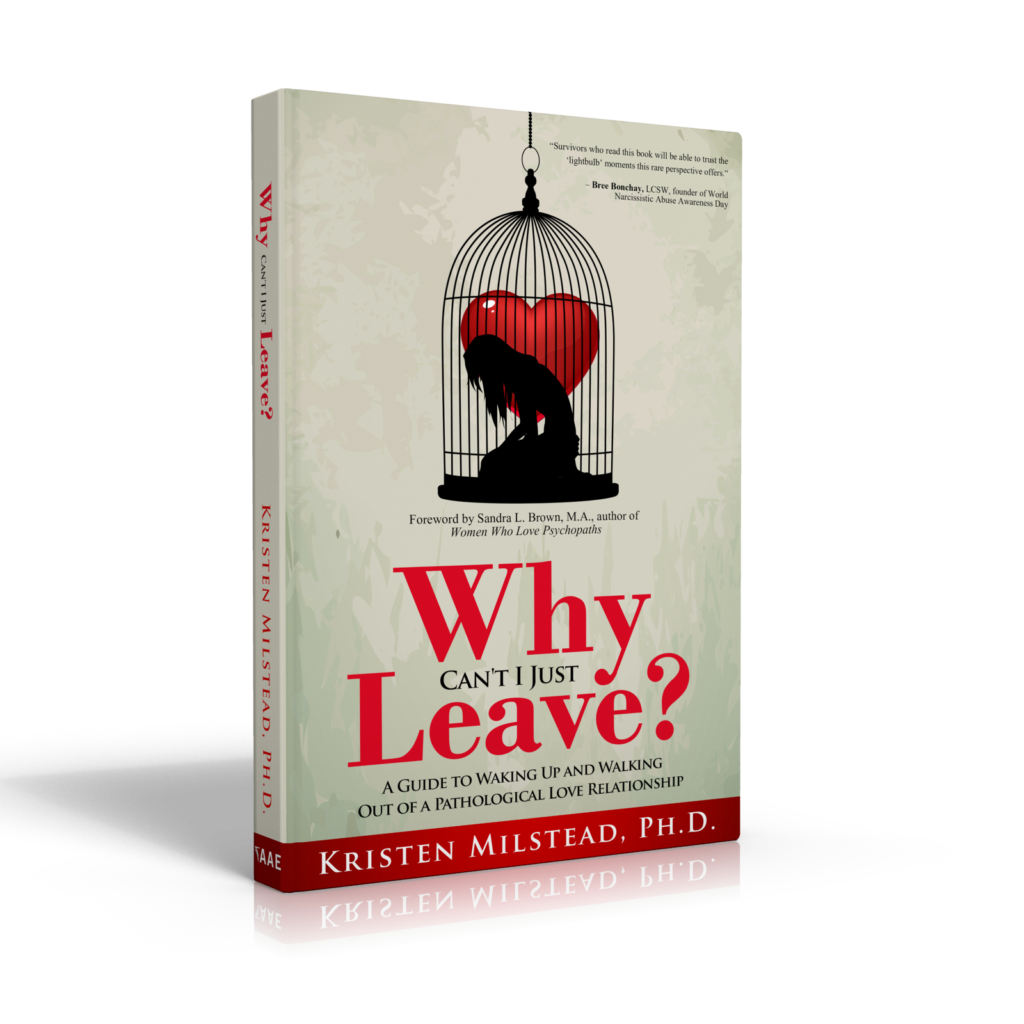“The psychopath is like a color-blind person who sees the world in shades of gray but who has learned how to function in a colored world. He has learned that the light signal for “stop” is at the top of the traffic signal. When the color-blind person tells you he stopped at the red light, he really means he stopped at the top light. He has difficulty discussing the color of things but may have learned all sorts of ways to compensate for this problem, and in some cases, even those who know him well may not know that he cannot see colors. Like the color-blind person, the psychopath lacks an important element of experience– in this case, emotional experience–but may have learned the words that others use to describe or mimic experiences that he cannot really understand.” -Robert Hare, Without Conscience (p. 129)
One of the unusual things I started to notice about my ex-boyfriend is how he reacted to films.
He never once cried during a movie. He loved to turn and watch me cry, however, sometimes even smiling slightly as if it fascinated. And he loved putting on movies he knew would make me cry.
It didn’t stop there. Towards the end, after I’d already started reading about narcissists and narcissistic abuse, I noticed something else as well. He rarely liked to watch horror films, but when we did watch them he never jumped at the cheap scares the films always throw in to try to startle you.
I guess it’s an empathy problem. If you can’t empathize emotionally with the characters you watch on screen, your own emotions are not going to be triggered by what happens to them.
It’s the same reason they can listen to us tell them how much they have hurt us or hear us cry and just sit there completely emotionless, staring blankly at nothing, as if we’re not even in the room.
Because of things like this, one of the things it’s easy to forget is that narcissists do have emotions. Yet the emotional expressions that we see are not likely to be what we think they are.
Some emotions are felt almost exclusively as a result of our feelings of connection with other people, such as guilt. Therefore, narcissists would be inhibited in their abilities to feel them. In addition, other emotions are expressed for a variety of reasons, and some of them are related to our connections with others. Yet narcissists may only feel them for self-centered reasons.
So when narcissists exhibit emotions, there are at least three reasons why that makes being in a relationship with them confusing and problematic.
- As Hare describes in the quote above, they have learned how to get by in the world by learning how to talk about and mimic the emotions they don’t fully feel or even feel at all without others being able to tell the difference;
- Since they do express some emotions genuinely, such as rage, it is difficult to tell where the line is between the real emotions and the fake ones;
- Even when the emotions expressed are genuine, the motives or explanation behind them may be misrepresented. For example, if they express love for us, it is not because they “love” us for any unique quality about us, but for how well we are currently providing them with narcissistic supply. That isn’t evident from the emotional display itself.
We automatically equate emotions with humanity, as one of the things that separate us from other animals. Therefore, we project onto our narcissist partners the ability to feel and express genuine emotion, and we take the emotions presented to us at face value.
But this is often why a narcissist’s words and actions do not match.
So which of the emotional displays are likely to be real and which are not?
The Emotional Range of the Narcissist

There’s a very clear indication that if a narcissist is displaying any of the emotions below, then you have caught them in something “real.”
Enamored
Definition: a state of complete purported infatuation with you and fascination with everything about you
What Motivates this Emotion in the Narcissist: The “garden variety narcissist” desperately wants to believe that he or she has found perfect love and the image that he or she is projecting will be loved and admired forever. He or she can feel these idealized feelings of love for a partner who idealizes them. A malignant narcissist or psychopath, however, may say and do these things just to extract something from a partner, knowing that they aren’t true.
Characterized by:
- elaborate promises
- intense chemistry
- a lot of passion and sexual activity that is off the charts
- domination of your free time
- showering you with excessive admiration, gifts, praise, and affection
- bonding with you at a spiritual, mental and “emotional” level through the exchange of personal details, close contact, and absolute acceptance
Things the Narcissist Says:
- “My life was so empty before I met you.”
- “You’re the only one who has ever understood me.”
- “I’ve never loved anyone like this before.”
- “We have a connection that was meant to be.”
Pride
Definition: the state of over-appreciation by the narcissist for him or herself or a particular quality, or for a person that he or she associates with; if for the self, often (but not always) unaccompanied by achievements or hard work
What Motivates this Emotion in the Narcissist: This excessive pride is an overcompensation for low feelings of self-worth. The narcissist projects the image that he or she wants others to see and needs constant validation that this is what others see so that the narcissist can believe it and keep the feelings of worthlessness at bay. It’s quite a contradiction.
Characterized by:
- boasting
- the expectation that a goal will be achieved without a plan to reach it or acting as if it has already been reached
- name-dropping
- talking about the accomplishments of others as if they are their own
Things the Narcissist Says:
- “Don’t you know who I am?”
- “My _________ is so much better than everyone else’s.”
- “Damn, I look so good.”
Jealousy
Definition: a state of being overly obsessive about the threat of any of your “narcissistic supply” going elsewhere; a tool the narcissist uses to control you, usually by disguising it behind other emotions or occurences such as concern, “valid” suspicions, or past betrayals by others
What Motivates this Emotion in the Narcissist: The narcissist thinks of the partner as a possession that he or she needs to control in order to maintain the reality that he or she has crafted where everyone is playing a specific role. At the thought that they might lose something to someone else that they feel entitled to– you– they will feel intensely jealous. Losing you to someone else is a form of rejection that triggers the feelings of worthlessness, hence the strong need to control.
Characterized by:
- excessive monitoring of your whereabouts
- questions about your activities, friends and other aspects of your life
- accusations of wrong-doing
- your inability to ever prove that you aren’t doing anything “wrong” because you’re always viewed as guilty and every action can potentially be misconstrued if the narcissist chooses to do so
Things the Narcissist Says:
- “Who is that person? Why did you add them to Facebook?”
- “Why didn’t you answer your phone? Why is it taking you so long to text me back?”
- “You didn’t go get your nails done. I know it doesn’t take that long.”
- “Sure he’s just a friend. I know what that means.”
Envy
Definition: the state of intensely coveting what someone else has
What Motivates this Emotion in the Narcissist: The narcissist has low self-esteem and is always comparing himself or herself to everyone else, and always finds things to lack in himself or herself because of it.
Characterized by:
- obsessive rumination or discussion about the desire
- devaluing the person who has the coveted qualities or items, or even the qualities or items themselves
- pretending as if they don’t want the things they covet
- talking about how what they have is better
- sometimes befriending the person with the qualities to attempt to learn how to get something from the person or as a way to “befriend the enemy”
Things the Narcissist Says:
- “I guess what they did is okay… but I could have done better if I’d had the opportunities they had.”
- “I don’t understand why everyone likes [him/her] so much.”
- “They’re so fake. They probably lied to get that anyway.”
Contempt
Definition: the state of barely-disguised disgust and loathing directed at you and anything you do; also directed at others (e.g., people the narcissist envies)
What Motivates this Emotion in the Narcissist: The narcissist is self-loathing and often projects that feeling outward, especially when someone fails to reflect back an idealized version of the narcissist that eases the pain he or she feels due to the self-loathing.
Characterized by:
- glares
- cutting, sarcastic comments, and put-downs
- ignoring you and silent treatments
- smear campaigns
Things the Narcissist Says:
- “Nothing I do is ever good enough for you.”
- “I don’t even know why I stay here. I could be with anyone right now.”
- “My ex never argued and asked me a bunch of stupid questions like this.”
- “Everyone thinks you’re crazy.”
Anger
Definition: the state of becoming enraged to the point of threatening to harm, causing harm or causing the other person to believe harm is imminent
What Motivates this Emotion in the Narcissist: If something gives the narcissist a “narcissistic injury,” it can trigger feelings of rejection, abandonment, and shame in the narcissist. He or she will avoid those feelings and an immediate defense mechanism of anger (“narcissistic rage”) will take over to keep the narcissist from plunging into those feelings of worthlessness and maintain the feeling of superiority.
Characterized by:
- visible changes in body language and facial expression indicating hatred and agitation
- dangerous, threatening actions indicating physical harm may be imminent or actual physical harm
- threats of harm
- verbal abuse
- trapping or blocking escape
Things the Narcissist Says:
- “You never meant anything to me.”
- “I hope you die.”
- “I hate you.”
- “You’ll be sorry.”
Glee
Definition: the state of being giddy or excessively happy, mixed with the smugness of superiority
What Motivates this Emotion in the Narcissist: This is not the type of lovesick giddiness that you may see when they are enamored of you. This is the emotion they may display when they know they have been cruel to you and are enjoying your reaction. There is a sense of power and control they gain by hurting you and you can see the pleasure they get in response to your pain.
Characterized by:
- smug smiles
- laughter
- comments to “rub it in”
Things the Narcissist Says:
(while smiling)
- “Aw, don’t cry.” [sarcasm]
- “Oh, stop crying.” [disgust]
- “You’re pathetic.”
Indifference
Definition: the lack of emotion the narcissist always seeks to escape by stirring up drama and seeking narcissistic supply
What Motivates this Emotion in the Narcissist: This is the default state at the core of the narcissist. Other emotions are either manufactured or triggered. When he or she no longer wants narcissistic supply from you, the narcissist can quickly shift so that this becomes their dominant state toward you.
Characterized by:
- utter lack of attachment or loyalty to anyone
- internal emptiness
- boredom
- a lack of interaction, emotion or acknowledgment, if directed at a person
Things the Narcissist Says:
{Nothing. It’s as if you don’t exist.}
What About Covert Narcissists?

Overt narcissists are more likely to have overt displays of rage and more antagnonistic emotions. They willl more openly boast and display contempt and pride. Their other emotions may also seem dramatic and impulsive, and they may more openly boast and express contemptuous or jealous obvious behaviors.
Covert narcissists, however, may be more difficult to detect, as their emotions may not be so up-and-down or out-in-the-open.
According to Shahidi Arabi, however, there is an emotional expression mismatch in their behavior to watch out for.
Although they will often purport to be the “nice guy or girl,” at some point, they will start doing and saying things occasionally that don’t align with that image. It won’t be just once or twice– it will be more like an attitude that leaks out beneath their exterior.
“If you observe a manipulator closely, they always display micro-signals of contempt when they are speaking. No matter how hard they try to disguise these beneath their façade, their disgust for the human race and the silly “morals” of lesser mortals seeps through every pore of their skin, every shift in their tone, every twitch in their gestures. It seeps through their proposed principles and exposes their real feelings,” Arabi says.
Covert narcissists, therefore, may obscure envy, jealousy, anger behind subtle displays of contempt or smugness that they either cannot help or are not aware of.
Whether overt or covert, however, the list of emotions that you likely won’t see unless they are fabricated is the same.
Which Emotions Are Likely to Be False?
There are a few important emotions that are noticeably absent from the roster of the available range.
Fear. The thing is, they’re scared. Not in the way that you and I get scared. They’re scared of being exposed, of being called out for putting on a mask. They’re also scared of rejection and humiliation. When they start to feel fear, however, they usually mask it with anger.
Shame. Narcissists cannot feel shame and will project it onto a target, usually the person who they blame for triggering their narcissistic injury.
Guilt. Narcissists are not able to feel emotional empathy. If they regret their actions, it is not because they feel bad for doing something.
Love or Intimacy. Narcissists do not know how to commit to a love that involves self-sacrifice and mutual trust and honesty, and cannot know the feeling of connecting with someone at the emotional level where you feel what they feel.
Joy or Peace. Narcissists are exhausted, always seeking narcissistic supply, worried about losing it, and making sure that they are not exposed. They are also incredibly envious and contemptuous of others. They do not connect with others and bored by the simple pleasures in life.
What About Sadness?
Narcissists can feel sad.
They can feel sadness over things that affect them.
They cannot imagine how you feel when you are sad and then feel sad because you are sad.
They can feel sad about losing someone important to them, however, they will not grieve over it, for they do not feel attached to the person.
* * * * *

The main thing to remember is that the emotions of a narcissist do not necessarily reflect the true mindset of the narcissist, however, some of what they express is likely going to be from the “true self.”
For example, with a couple of exceptions, narcissists are walking advertisements for emotional manifestations of the “seven deadly sins.”
That makes sense as the seven deadly sins are largely about excess, and when it comes to narcissism, what is “excessive” is either viewed as normal from a narcissist or an entitlement for one.






17 Comments
wEeB
um im sort of a narcissist but i would never imagine treating someone like this. sO-
Kristen Milstead
Hi wEeB, thank you for commenting. Just to comment on this–as you are probably aware already, there is a spectrum of narcissism and it is possible you have some of the criteria but don’t meet the full criteria for a diagnosis of NPD. It’s also possible that the dimensions of the criteria that you fall under for the disorder may not overlap with the more exploitive aspects of the diagnosis. For example, someone needs only five of nine criteria. Probably the most pessimistic interpretation of your comment is that it’s also possible that a person with the diagnosis is not aware of how they are hurting or harming others. Hopefully, that’s not the issue. If you find that you are troubled by the idea that you might be a narcissist, there are mental health professionals that treat narcissists and you could seek one out. I appreciate your insight. -Kristen
BC Mitchell
My x narcissist showed no concern when his son suffered an injury while playing in a basketball game. When his son fell and was yelling in pain a and crying I jumped up and ran for him( he wasn’t my son) I looked back and he was just sitting there! I said it’s $&@&, he just sat there totally unconcerned. After I and others got to the boy he gets up and walks over, he didn’t comfort the boy in any way. After we left er. Aaa did got home with instructions to ice and give pain meds to the boy. He fussed when I got ice bag and ibuprofens for him- saying from his throne( recliner) He’ll be okay- he doesn’t need all of that. POS even told his son ( when he scored 12points) that if he had been playing he would have scored 50 points!! Oh my gosh he was the devil in disguise- I didn’t just walk away— I ran. God help his son. I pray for that kid everyday.
Miskell
I have been searching for a post like this for a very
long time. I was seeking someone who would be in a position to definitely navigate me on this issue and was
lucky enough to locate you. Thanks a lot for your detailed reason, you drew attention to a very
common matter! Although I share your opinion for the most part,
I presume that a few things are worth having a more detailed appearance
to understand what is going on.
Fredro
Nice post!
Royvia
Great post.
Kim
Thank you for a well written article. I keep finding more and more information about this personality disorder. I am currently in the course of divorcing a narcissist to my therapist says is one of the most extreme cases she’s ever seen, short of physical violence (the one boundary I was able to convince him was unacceptable). He financially, emotionally and spiritually abused me for 35 years. I basically have Stockholm syndrome. I wonder if you might have some research done on that phenomena. I find it very hard to get his negative behaviors and words out of my head. I I often find myself experiencing guilt and shame for leaving him. Once again thank you for your article.
Gina
Susanna ,it depends on their age .If they’re old enough to understand you tell them it’s nothing they have done ,they are loved & some people can’t show love .Later ,you can have another conversation about some people have a personality problem or ‘disease ‘ that makes them unable to show love or care about other people .Lead by example & show your children acts of kindness towards others .Even small acts of kinds towards others will teach them how nice it feels to be kind to others .???
Gina
Susanna ,it depends on their age .If they’re old enough to understand you tell them it’s nothing they have done ,they are loved & some people can’t show love .Later ,you can have another conversation about some people have a personality problem or ‘disease ‘ that makes them unable to show love or care about other people .Lead by example & show your children acts of kindness towards others .Even small acts of kinds towards others will teach them how nice it feels to be kind to others .????????????
Susanna
How do you explain to your kids that their dad doesn’t care about them? They’re not important to him and it breaks their hearts.
Susanna
How do you explain to your kids that their dad doesn’t care about them? They’re not important to him and it breaks their hearts.
Jennifer
Very enlightening and well written, the best explanation I’ve come across so far of their “emotions” and how they “look” to us, very helpful in understanding their side, and to help us as victims reconcile cognitive dissonance. Thank you
Jennifer
Very enlightening and well written, the best explanation I’ve come across so far of their “emotions” and how they “look” to us, very helpful in understanding their side, and to help us as victims reconcile cognitive dissonance. Thank you
Kristen Milstead
I’m glad that you enjoyed the post. Thank you for reading.
pascaleshealingjourney
Very interesting post. It is such an accurate description of narcissists. Down to the things they say.
pascaleshealingjourney
Very interesting post. It is such an accurate description of narcissists. Down to the things they say.
Kristen Milstead
I’m glad that you enjoyed the post. Thank you for reading.